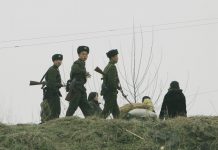North Korea’s national police agency recently handed down fourth quarter production quotas to reeducation camps under its administration, Daily NK has learned.
Speaking on condition of anonymity for security reasons, a Daily NK source in South Hamgyong Province reported on Nov. 2 that “a reeducation camp in Hamhung received orders from the Production Division of the Ministry of Social Security [MSS]’s Reeducation Department regarding November’s export production quotas on Oct. 28.”
The source said that the Hamhung reeducation camp is just one example of how North Korea uses reeducation camp inmates to produce goods for export.
He told Daily NK that the ministry’s Reeducation Department revised the list of items which have long been produced at the Hamhung prison camp, and set new goals for the camp to complete by the end of this year. Items on the new production list included a variety of hand-made goods, including knit goods, crochet products, false eyelashes, wigs, leather goods (excluding shoes), metal bands, bracelets, and accessories.
The department also ordered reeducation camps across the country to begin producing shoe molds in the fourth quarter, the source said.
Between shortages of labor, technology, equipment, and raw materials, inadequate technology for producing newly requested items, and the short timeline to produce the goods by the end of the year, camp officials are concerned that they will not be able to meet their quotas, he said.
“This isn’t unique to the Hamhung reeducation camp. Camps all across the country are facing similar dilemmas,” the source added.
Since quotas set by the MSS Reeducation Department’s Production Division are part of broader national economic plans, all camps are used to achieve them. However, the lack of manpower and resources at reeducation camps makes fulfilling these quotas in such a short time span a challenging task.
The source further explained that when new items are added to the production list, it becomes even more difficult because camps need to make all of the necessary arrangements to manufacture them from scratch.
In early October, the reeducation camp in Hamhung had already imported small-scale equipment and materials, including a special glue, needed to mass produce false eyelashes.
Although it is natural for reeducation camps to be told to produce export goods for foreign currency-earning activities after the fall harvest season, camp officials are concerned that they will be hard-pressed to meet this year’s quotas by the shipment deadline.
The low-level camp officials directly in charge of the various production units are especially worried about whether they will be able to meet the quotas laid out by the Production Division, the source said.
“The government sells the goods produced in the camps for foreign currency, but never pays the camps in cash. Instead, all the camps receive is non-cash goods or grains. As a result, everyone [at the camps] simply focuses on finding ways to meet the production deadline and avoid criticism [from their superiors].”
The products manufactured inside the Hamhung reeducation camp are often exported to China through Sinuiju or sent to companies in the Rason Special Economic Zone to undergo further processing before being exported overseas, the source added.
Translated by Matthew Eteuati, Jr. Edited by Robert Lauler.
Daily NK works with a network of sources who live inside North Korea, China and elsewhere. Their identities remain anonymous due to security concerns. More information about Daily NK’s reporting partner network and information gathering activities can be found on our FAQ page here.
Please direct any comments or questions about this article to dailynkenglish@uni-media.net.


















